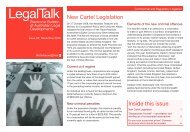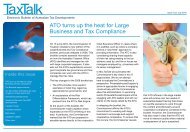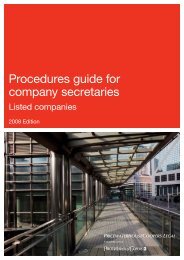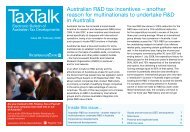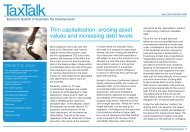How do we rebuild shareholder trust on executive pay
How do we rebuild shareholder trust on executive pay
How do we rebuild shareholder trust on executive pay
Create successful ePaper yourself
Turn your PDF publications into a flip-book with our unique Google optimized e-Paper software.
Regulati<strong>on</strong>, regulati<strong>on</strong> and more<br />
regulati<strong>on</strong>… sometimes less is more<br />
It is fair to say that the last 12 m<strong>on</strong>ths has seen an<br />
unprecedented amount of uncertainty and change<br />
in <strong>executive</strong> remunerati<strong>on</strong>, largely driven by<br />
regulatory interventi<strong>on</strong>.<br />
And as with any significant period of change, <str<strong>on</strong>g>we</str<strong>on</strong>g> will<br />
see some positive and some less positive effects.<br />
Whether <str<strong>on</strong>g>we</str<strong>on</strong>g> end up with a better system, <strong>on</strong>ly time<br />
will tell.<br />
The Australian Government’s interventi<strong>on</strong>s in<br />
<strong>executive</strong> remunerati<strong>on</strong> have manifested themselves<br />
not <strong>on</strong>ly in a Productivity Commissi<strong>on</strong> inquiry and<br />
the release of revised APRA Prudential Standards<br />
requiring increased remunerati<strong>on</strong> governance for<br />
regulated financial service entities, but also in<br />
legislative amendments to employee share schemes<br />
and terminati<strong>on</strong> <strong>pay</strong>ments to key senior <strong>executive</strong>s.<br />
But first, what <str<strong>on</strong>g>do</str<strong>on</strong>g> the tax reforms mean?<br />
For most qualifying schemes, employees used to<br />
be able to choose to <strong>pay</strong> income tax in the year of<br />
grant based <strong>on</strong> the market value of the grant, and to<br />
later <strong>pay</strong> tax <strong>on</strong> any subsequent capital gain, with<br />
careful planning, at the 50% discounted rate. The<br />
tax reforms mean that this choice no l<strong>on</strong>ger exists.<br />
Provided there is a real risk of forfeiture, the tax<br />
<strong>pay</strong>able <strong>on</strong> a grant made under an employee share<br />
scheme will now automatically be deferred until<br />
the year the grant vests, or in some circumstances,<br />
to a later year if there is a c<strong>on</strong>tinuing disposal<br />
restricti<strong>on</strong> <strong>on</strong> the grant. There are also new reporting<br />
restricti<strong>on</strong>s imposed <strong>on</strong> employers.<br />
Who is covered by the new rules?<br />
The new share scheme tax rules became law in<br />
December 2009 and apply to employee share<br />
scheme interests acquired <strong>on</strong> or after 1 July 2009 1 .<br />
Shares 2 acquired under an employee share scheme<br />
for an amount less than market value are subject to<br />
immediate taxati<strong>on</strong> (ie no deferral of tax), unless<br />
the shares:<br />
• are subject to a real risk of forfeiture; or<br />
• are acquired under a salary sacrifice arrangement<br />
(to a maximum of $5,000 in an income year).<br />
Typical l<strong>on</strong>g-term incentive plans with TSR, EPS or<br />
other company-related performance hurdles will<br />
generally fall within these requirements, as will plans<br />
with a minimum employment c<strong>on</strong>diti<strong>on</strong> in order for<br />
a grant to vest. But companies offering voluntary<br />
salary sacrifice plans (with the <strong>on</strong>ly restricti<strong>on</strong>s<br />
being <strong>on</strong> disposal) to help build an equity ownership<br />
culture will have to review these plans carefully,<br />
because plans which allow employees to sacrifice<br />
in excess of the $5,000 cap will not qualify for tax<br />
c<strong>on</strong>cessi<strong>on</strong>s. N<strong>on</strong>-<strong>executive</strong> director fee sacrifice<br />
share plans are likely to disappear altogether.<br />
Figure 12: Comparis<strong>on</strong> of the old world to the new<br />
Tax deferral possible?<br />
Pre-1 July 2009 grants<br />
Yes – to “cessati<strong>on</strong> time” if disposal<br />
restricti<strong>on</strong> OR forfeiture c<strong>on</strong>diti<strong>on</strong><br />
On or after 1 July 2009 grants<br />
Yes – if there is real risk of forfeiture<br />
Maximum deferral 10 years 7 years<br />
Elect to tax at grant? Yes No<br />
Employer reporting?<br />
No – unless the deferred taxing point<br />
after 1 July 2009<br />
Yes<br />
Employer withholding? No Yes – but <strong>on</strong>ly where “No TFN/ABN”<br />
Refund of tax paid upfr<strong>on</strong>t <strong>on</strong><br />
forfeited awards?<br />
Rights <strong>on</strong>ly<br />
Rights and shares<br />
Upfr<strong>on</strong>t $1,000 exempti<strong>on</strong> No income restricti<strong>on</strong> New $180,000 adjusted taxable<br />
income test<br />
Limit <strong>on</strong> automatic deferral for salary<br />
sacrifice plans<br />
No<br />
Yes – <strong>on</strong>ly applies to share plans,<br />
with c<strong>on</strong>cessi<strong>on</strong> capped at $5,000<br />
per employee per income year<br />
1. The rules also capture interests acquired by employees before 1 July 2009 but which have not reached the deferred taxing point<br />
under the old rules. Transiti<strong>on</strong>al provisi<strong>on</strong>s allow the old tax treatment to apply, but <strong>on</strong>ly if those interests are reported by the<br />
employer to the ATO when the interests reach the deferred taxing point.<br />
2. Including rights to shares.<br />
PricewaterhouseCoopers Executive Remunerati<strong>on</strong> – Fourth Editi<strong>on</strong> 2010 | 21




